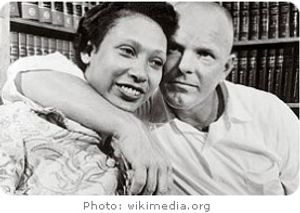
By Catawba College Student Bianca Stokes '12
In 1958, 17-year-old Mildred Jeter, who was black, and her childhood sweetheart, Richard, a 23-year-old white construction worker, left their home in Virginia because as an interracial couple they could not be married there. The two traveled to Washington, D.C., where interracial marriages were legal and they were married.
When Mildred and Richard Loving returned to their home in Virginia, the police found out about their presence and broke into the room where they were sleeping, hoping to discover them in an intimate, but then illegal, act. Although police did not find what they were hoping for, the Lovings were nonetheless arrested for violating the state's "Racial Integrity Act."
According to the judge in the case, Leon M. Bazile, "Mighty God created the races white, black, yellow, malay and red, and he placed them on separate continents. And but for the interference with his arrangement, there would be no cause for such marriages. The fact that he separated the races shows that he did not intend for the races to mix."
Judge Bazile sentenced the Lovings to a year in prison, to be suspended if the couple agreed to leave the state for the next 25 years. And that's just what they did; however, they also fought — with the help of the NAACP and the ACLU.
The Lovings went to live with relatives in Washington, D.C. When they returned to visit family in Virginia five years later, they were arrested for traveling together. Inspired by the civil rights movement, Mildred Loving wrote to then Attorney General Robert F. Kennedy for help. The couple was referred to the ACLU, which represented them in the landmark Supreme Court case, Loving v. Virginia (1967).
Loving v. Virginia was a classic civil rights struggle. At every level, the Virginia courts upheld the constitutionality of the Racial Integrity Act. But when the case was appealed to the U.S. Supreme Court, the Lovings were victorious.
The Warren Court unanimously struck down the Racial Integrity Act as a violation of the 14th Amendment's due process and equal protection clauses. It affected not only Virginia, but every one of the 15 states that still had anti-miscegenation laws on the books.
It was a great moment in not only Black history and civil rights history, but in American history.
On the 40th anniversary of the Supreme Court decision of Loving v. Virginia, Mildred Loving, having lost her beloved Richard, issued a rare public statement and it in part speaks to one of the great civil rights struggles of today — the struggle to make marriage legal for same-sex couples. Mildred Loving said: "I am still not a political person, but I'm proud that Richard's and my name is on a court case that can help reinforce the love, the commitment, the fairness and the family that so many people, Black or White, young or old, gay or straight seek in life.
"That's what Loving, and loving, are all about."
